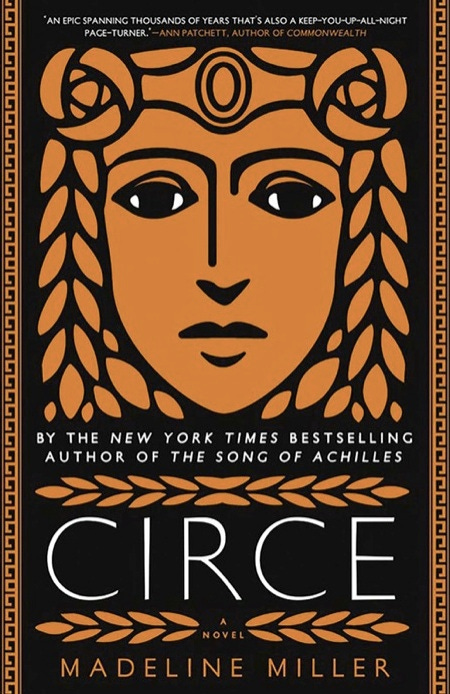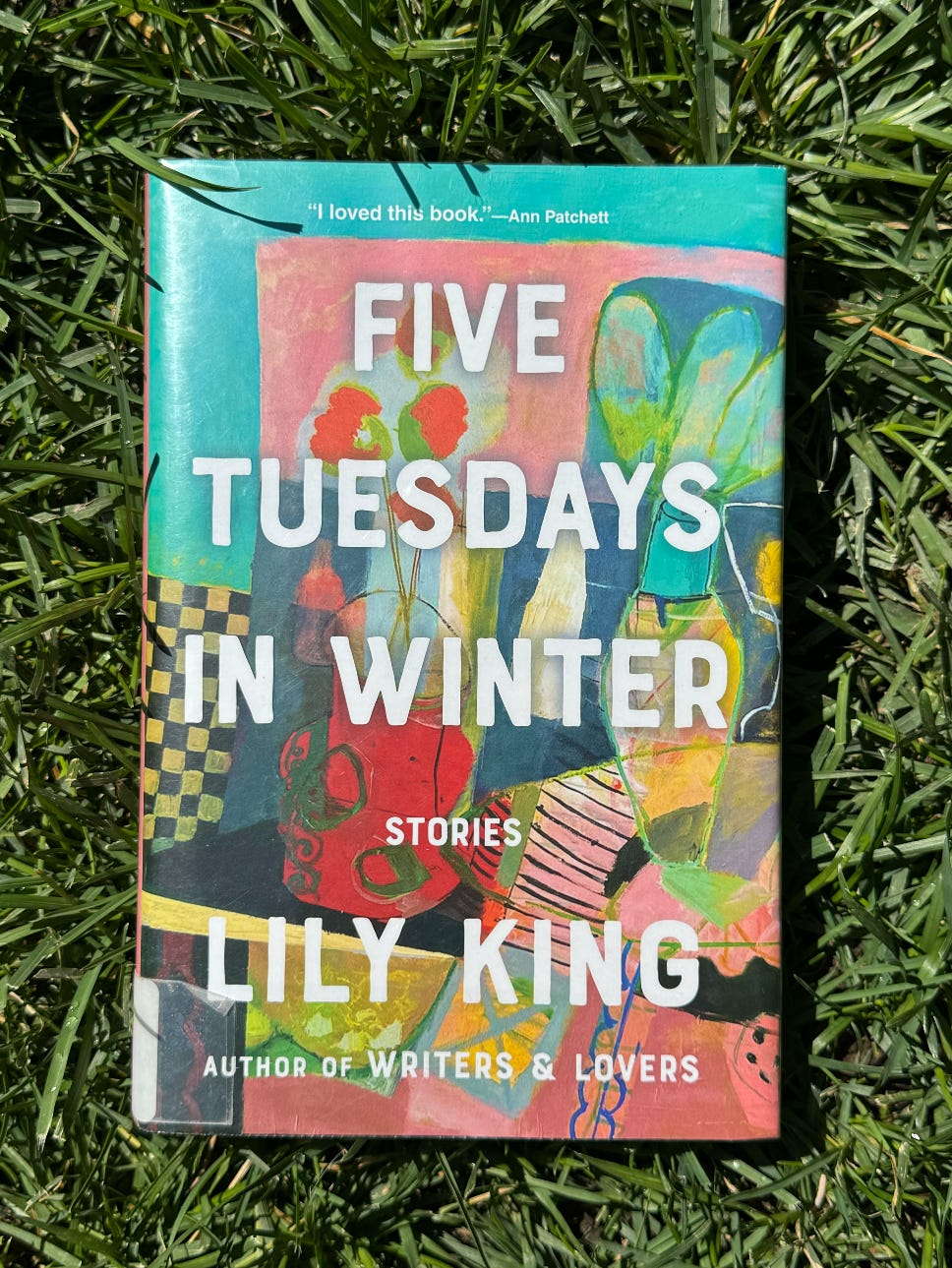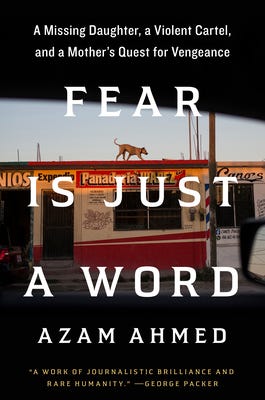what I read last week
circe, clean, five tuesdays in winter, fear is just a word, grief is for people
I read five pretty incredible books this past week — I hope you enjoy this roundup!
Circe by Madeline Miller
So yes, I have read three Greek retellings in the past three weeks (I’ve also read The Women of Troy and The Silence of the Girls recently). Circe is my favorite so far. You probably know Circe from The Odyssey — She is a nymph (daughter of the sun god Helios) who turns Odysseus’s men into pigs. Circe exists on the periphery of countless myths. She cleansed Medea and Jason (of the golden fleece) of their crimes. She is the sister of Pasiphae (the wife of King Minos and the mother of the Minotaur and Adriadne). Most stories and myths about Circe do not cast her in a sympathetic light. She is often considered the archetype of the predatory female (when one god rejects her, she turns his lover into a sea monster). But Miller provides a new perspective on Circe — Miller’s Circe lashes out because she is immature and deeply unhappy.
I could not put this book down. Ann Patchett’s blurb on the cover says it all —“An epic spanning thousands of years that’s also a keep-you-up-all-night page-turner.”
A few quotes:
“He showed me his scars, and in return he let me pretend that I had none.” (This sounds like a Taylor Swift lyric in the best possible way.)
“But perhaps no parent can truly see their child. When we look, we see only the mirror of our own faults.”
“It is a common saying that women are delicate creatures, flowers, eggs, anything that may be crushed in a moment’s carelessness. If I had ever believed it, I no longer did.”
Circe and her father:
So many years I had spent as a child sifting his bright features for his thoughts, trying to glimpse among them one that bore my name. But he was a harp with only one string, and the note it played was himself.
“You have always been the worst of my children,” he said. “Be sure to not dishonor me.”
“I have a better idea. I will do as I please, and when you count your children, leave me out.”
My Rating: 4.5/5
Genres: Fiction - Myth Retelling
Audio: This would work on audio (good British narrator, 12 hr 8 min).
Movie/TV Pairings: A TV adaptation (see this Deadline article) is in the works!
Clean by Alia Trabucco Zerán (translated by Sophie Hughes)
Limpia by Alia Trabucco Zerán
I can’t stop thinking about Clean. Originally published in Spanish in 2022, Clean has recently been translated into English. I read it in Spanish, but the English translation is in bookstores in the UK and will be published in the US in October. Alia Trabucco Zerán, the author, also wrote The Remainder (shortlisted for the Booker International Prize) and When Women Kill.
Clean opens with the news that Julia, the young daughter of a successful lawyer and doctor in Chile, has been found dead. She drowned in the family’s pool. Estela, the family’s longtime maid (and our narrator), is brought in for questioning at the police station. From the interrogation room, Estela recounts her time with the family. She moved from the countryside to Santiago to work as a maid, nanny, and cook for the family. She wears a pressed and starched uniform and works 6 days a week. Estela is both invisible (“I surrendered, voiceless, and eventually lost the desire to talk”) and indispensable.
[My mama had told me] it would be difficult, almost impossible, to quit working as a maid. It’s a trap, she told me. You hang around waiting for a lucky break, and you secretly tell yourself: I’m leaving this week, next week for certain, next month will be my last here. And you just can’t, Lita, that’s what my mama warned me. You just can’t leave. You can’t ever say: Enough. You can’t say: No, I’ve had it, Señora, my back hurts, I’m leaving. It’s not like working in a shop or out in the fields or doing the potato harvest. It’s a job that’s kept out of sight . . . . There’s no good loving your masters. They only love their own.
Her narrative reads like a combination of a social critique and a pseudo-thriller. She slowly divulges details (She tells the interrogators, “That’s enough for today,” and she frequently urges them to “write this down”). The tension builds from the small details (the father’s disturbing way of teaching Julia to swim, the family’s cruelty to Estela, the secrets they all keep). Alia Trabucco Zerán’s prose is controlled and crisp. If you read the translation, you should check out her translator’s fascinating article (link here) on the art of translation.
My Rating: 4/5
Genres: Contemporary Fiction (Social Critique Thriller); Fiction in Translation
Movie/TV Pairings: Parasite; The Maid (2009 film from Chile)
Five Tuesdays in Winter by Lily King
I recently read Euphoria (about a love triangle among anthropologists in New Guinea in 1933 — read my review here) and Writers and Lovers (about a struggling writer in Boston in 1997 — read my review here) by Lily King. So this week, I picked up Five Tuesdays in Winter, King’s collection of short stories, from the library.
King brings her measured prose and emotional range to these ten stories. They do not disappoint. My favorites were: “Five Tuesdays in Winter” (about a bookshop owner and single father of a teenage girl who falls in love with an employee); “When in Dordogne” (about two college friends who move into a professor’s home to look after his adolescent son following the professor’s mental health crisis); and “The Man at the Door” (a magical realist story about a novelist who slays her demons).
My Rating: 3.8/5 (My rating is slightly lower because some stories are much better than others!)
Genres: Contemporary Fiction - Short Stories
Fear Is Just a Word by Azam Ahmed
In Fear Is Just a Word, Azam Ahmed recounts the story of Miriam Rodríguez and her quest to track down the Zetas drug cartel members who kidnapped and murdered her daughter in 2014. Ahmed is the former Mexico bureau chief for The New York Times (and currently an investigative reporter for NYT).
Fear Is Just a Word takes place in San Fernando, a small town in Tamaulipas, Mexico — the battleground of a brutal turf war between the Gulf cartel and Zetas. Ahmed exhaustively researched the Rodríguez family and broader political history. It’s impossible not to be drawn in by Miriam Rodríguez and her determination to track down her daughter’s killers. Rodríguez trails Zetas in her car, sleuths on Facebook, informs the police, and helps countless other families.
Miriam had said, “Fear was just a word.” To the Zetas, it was much more than that. Miriam knew that if someone wanted to kill her, they could. She was no head of state with round the clock protection. She couldn’t even get the cops to pass her house once every 24 hours. Fear was something she could countenance. Had learned to suppress and ignore. To some extent, so was death.
As Cristina Rivera Garza (author of Liliana’s Invincible Summer) writes in her New York Times review of Fear Is Just a Word, “It is not easy to write about violence. Potential pitfalls lurk at every turn of phrase: the re-victimization of victims, the appropriation of other people’s suffering and pain, the rendering of real evil as banal, to name a few.” Ahmed maintains a respectful distance from the material and writes clearly and insightfully.
That being said, I found it impossible not to compare this work to two other books about political violence and the disappeared — Say Nothing by Patrick Raden Keefe (about the IRA in Northern Ireland) and Some People Need Killing by Patricia Evangelista (about the extrajudicial murders under President Duterte in the Philippines). Ahmed’s writing didn’t quite measure up to these books for me.
My Rating: 3.9/5
Genres: Nonfiction (Trauma/Disappeared)
Grief Is for People by Sloan Crosley
The last book I read this week is Grief Is for People, a memoir by Sloane Crosley. Crosley lives in New York and works in book marketing.
Crosley opens her book with a loss: a burglary and resulting theft of her jewelry collection. One month later, her best friend and former boss, Russell, takes his own life. “Right now, every time I try to separate these losses, to keep the first from contaminating the second, they come back together like magnets. Hideous sisters, they are keeping each other company in the dark. They are in conversation with each other.”
The memoir is divided into five parts: Denial, Bargaining, Anger, Depression, and Afterward (this is “Acceptance” in Kübler-Ross’s five stages of grief). Crosley mourns the death of her friend and who she thought she was. This book is well-written and moving.
A few quotes:
“To mourn the death of a friend is to feel as if you’re walking around with a vase, knowing you have to set it down, but nowhere is obvious. Others will assure you that there’s no right way to do this. Put it anywhere. But you know better. You know that if you put your grief in a place that’s too prominent or too hidden, you will take it back when no one’s looking. This is why I spend my nights looking into the restaurant. I fantasize about keeping Russell in front of me for a little longer. Each time the restaurant closes, each time he drops me off at my door, each time he walks off into the dark, and then he’s gone, and I am still holding this vase.”
“In Norwegian, the title of Munch’s masterpiece also translates to ‘The Shriek.’ Maybe the words have the same meaning in Norwegian, but there’s quite a difference in English. A shriek is more involuntary. It’s pain going in, not pain going out. It’s seeing a mouse in the kitchen. When it comes to Russel, I have no further interest in shrieking.”
My Rating: 3.9/5
Genres: Nonfiction - Memoir
Movie/TV Pairings: The Worst Person in the World; Fleabag
Articles I couldn’t stop thinking about: I’ve been trapped in the social media rabbit hole of the This Ends With Us cast drama. Check out this Glamour article:
In It Ends With Us, Lively plays Lily Bloom, a woman whose fairy-tale romance with Ryle (Justin Baldoni) turns into an abusive relationship when he becomes violent toward her. At the film’s premiere, Lively was asked what she would like to say to real life victims who might see the movie and recognize their own traumas in it. “I think that you’re so much—and not to minimize it—but you are so much more than just a survivor or just a victim,” Lively responded. “While that is a huge thing, you are a person of multitudes, and what someone has done to you doesn’t define you. You define you.” She added that It Ends With Us “is a story that covers domestic violence but it’s not about domestic violence.”
What this answer, like so much of our conversation about domestic violence, misses is the sense of shame victims of DV often experience. In fact, this is why Lively deserves huge props for bringing a nuanced portrayal of abuse to the forefront with IEWU. I just wish her response showed the same kind of nuance and sensitivity as the film. I’m sure it wasn’t her intention, but the language Lively used in this answer plays right into people’s shameful associations with DV.
Saying someone is “more than just a survivor” or “more than just a victim,” implies that there’s something bad about identifying as a victim in the first place. Or that being a victim is something that must be compensated for.
What I’m cooking: I’ve been cooking recipes from one of my favorite blogs, Alexandra’s Kitchen. She has fantastic baking recipes—try her peasant bread and this overnight foccacia. Also, I love this take on a green goddess salad.










